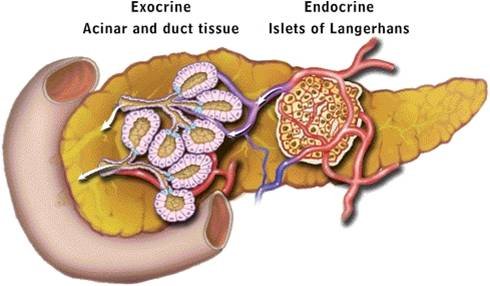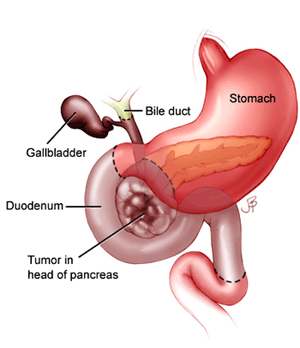Good afternoon everyone, today I start in the steemstem project and I will present a topic which is very important pancreatic cancer I have dedicated an exasperating research so that it can be analyzed and debated by all who wish to read it
Pancreatic cancer is a tumor which is more frequent in industrialized countries (it only constitutes 2% to 3% of all solid tumors), it represents the fourth cause of cancer death and it is predicted that by 2030 it will increase its incidence by 50%, thus becoming the second cause of cancer death and causing more deaths than prostate, colon or breast cancer

What is this cancer about?
Pancreatic cancer arises when cells in the pancreas, a glandular organ behind the stomach, begin to multiply out of control and form a mass. These cancerous cells have the ability to invade other parts of the body.
A clearer concept, the pancreas releases enzymes that help digestion and hormones that help you control your blood sugar.
Blood cancer spreads rapidly to nearby organs. Rarely detected in the early stages. But for people with pancreatitis or a family history of lung cancer, they can access an early problem.
How it develops

Pancreatic cancer occurs when the cells of the pancreas develop mutations in their DNA. These mutations cause cells to grow out of control and continue to live after normal cells die. These cells, which accumulate, can form a tumor. If left untreated, pancreatic cancer spreads to nearby organs and blood vessels.
Most pancreatic cancer begins in the cells lining the pancreatic ducts. This type of cancer is known as pancreatic adenocarcinoma or exocrine pancreatic cancer. Rarely, cancer can form in the cells that produce hormones or in the neuroendocrine cells of the pancreas. These types of cancers are known as islet cell tumors, endocrine pancreatic cancer and pancreatic neuroendocrine tumors.
Pancreatic cancer rarely occurs before age 40, and more than half of cases of pancreatic adenocarcinoma occur in people older than 70. Risk factors for pancreatic cancer include smoking, obesity, diabetes, and certain genetic conditions weird About 25% of cases are related to smoking, and 5-10% are related to inherited genes. Pancreatic cancer is usually diagnosed by a combination of medical imaging techniques such as ultrasound or computed tomography, blood tests and examination of tissue samples (biopsy). The disease is divided into stages, from early (stage I) to late (stage IV). It has not been found that detection of the general population is effective.
Types

Exocrine cancers
The exocrine group is dominated by pancreatic adenocarcinoma, which is by far the most common type, representing about 85% of all pancreatic cancers. Nearly all these start in the ducts of the pancreas, as pancreatic ductal adenocarcinoma (PDAC). This is despite the fact that the tissue from which it arises – the pancreatic ductal epithelium – represents less than 10% of the pancreas by cell volume, because it constitutes only the ducts (an extensive but capillary-like duct-system fanning out) within the pancreas. This cancer originates in the ducts that carry secretions (such as enzymes and bicarbonate) away from the pancreas. About 60–70% of adenocarcinomas occur in the head of the pancreas
Neuroendocrine
The small minority of tumors that arise elsewhere in the pancreas are mainly pancreatic neuroendocrine tumors (PanNETs).Neuroendocrine tumors (NETs) are a diverse group of benign or malignant tumors that arise from the body's neuroendocrine cells, which are responsible for integrating the nervous and endocrine systems. NETs can start in most organs of the body, including the pancreas, where the various malignant types are all considered to be rare. PanNETs are grouped into 'functioning' and 'non-functioning' types, depending on the degree to which they produce hormones. The functioning types secrete hormones such as insulin, gastrin, and glucagon into the bloodstream, often in large quantities, giving rise to serious symptoms such as low blood sugar, but also favoring relatively early detection. The most common functioning PanNETs are insulinomas and gastrinomas, named after the hormones they secrete. The non-functioning types do not secrete hormones in a sufficient quantity to give rise to overt clinical symptoms. For this reason, non-functioning PanNETs are often diagnosed only after the cancer has spread to other parts of the body
Risk factor
The factors that can increase your risk of pancreatic cancer are:
- Chronic inflammation of the pancreas (pancreatitis)
- Diabetes
- Family history of genetic syndromes that may increase the risk of cancer, including a BRCA2 gene mutation, Lynch syndrome, and familial melanoma syndrome with multiple atypical moles
- Family history of pancreatic cancer
- Smoke
- Obesity
- Older age, since most people are diagnosed after age 65
A large-scale study showed that the combination of smoking, long-term diabetes and poor diet increases the risk of pancreatic cancer beyond the risk of any of these factors alone.
News : Pancreatic cancer trial offers some hope
Australian researchers will lead a world-first trial of a potential new treatment for pancreatic cancer, offering a glimmer of hope to patients and their families.
Pancreatic cancer is too often fatal and claimed the lives of Apple co-founder Steve Jobs and actor Patrick Swayze.
In Australia, around 3300 people are diagnosed with the disease every year. Of those less than 10 per cent will survive longer than five years or longer.
Of the 90 per cent of patients to succumb to pancreatic cancer, the majority will die within the first year due to the fact it is caught late, says Professor John Rasko at Royal Prince Alfred Hospital.
"The worst part of the story is that pancreatic cancer has seen little progress compared to a number of other cancers over the last 20 years. So not only is it a devastating diagnosis but we haven't really developed a lot of promising new treatments for pancreatic cancer despite considerable efforts over many, many years," said Professor Rasko.
https://www.sbs.com.au/news/pancreatic-cancer-trial-offers-some-hope
Explanatory video
Conclusion
Regular consultation, especially if one of the symptoms mentioned above occurs. It is known that early detection is very important if you want to achieve a specific advance, since pancreatic cancer is one of the tumors with the highest mortality rate
It is only advisable to perform surveillance in those with hereditary factors associated with an elevated risk of ADP.
Ref Information
- "Advances in pancreatic cancer research: moving towards early detection"
- "Lifetime Risk of Developing or Dying From Cancer"
- "Pancreatic Cancer Treatment (PDQ®) Health Professional Version"
- "Pancreatic cancer"
- "https://www.mayoclinic.org"
- "History of pancreaticoduodenectomy: early misconceptions, initial milestones and the pioneers
- "Improving outcomes in pancreatic cancer: key points in perioperative management"
- https://es.wikipedia.org


Thank you for posting this article. My father died of pancreatic cancer, and, as you have mentioned it appears to be familial. Therefore the genetics of pancreatic cancer susceptibility is of some interest to me: Klein et al. Genome-wide meta-analysis identifies five new susceptibility loci for pancreatic cancer. (2018)